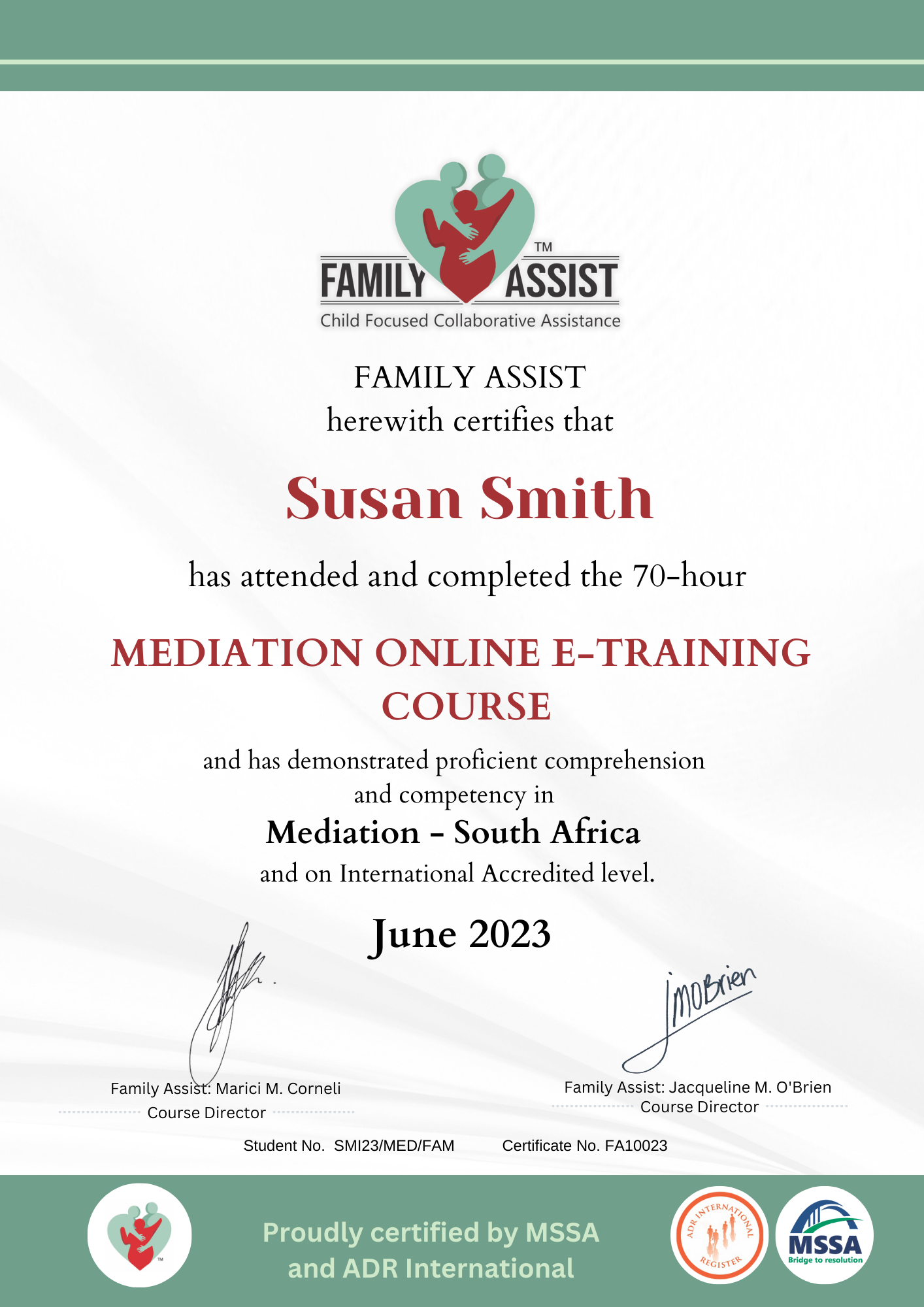Mediation Training
Mediation Training Course
Your online journey to become a successful Mediator
What does the Course entail?
- Relevant Family Law
- Industry best practices
- Hands-on Mediation Skills
- Legal Framework
- Conflict and Negotiation Skills
- Drafting of necessary agreements
- Basic knowledge for running and marketing a Mediation Practice
Cost
R10 900 for:
- 70hours worth of Course Material
- Pre-recorded Lectures
- Skills Test and Excersises
- Assessments
- Access to Mentors
- Internship
- Become part of the MediationWorx Network
Take Note!
- 23 CPD points for Social Workers
- The course is aligned with SAQA unite standard: 117848
- Accredited by MSSA
- Internationally accredited by the ADR International Register

We proudly present our
Family Mediation Online e-Training Course!
This online course Family Mediation Skills Training is comprehensive and includes relevant family law, mediation techniques, and industry best practices. It covers hands-on mediation skills, legal framework, conflict and negotiation skills, communication and interpersonal skills, self-awareness, cultural sensitivity, drafting of the necessary agreements, and basic knowledge of running and marketing a mediation practice.
The course is aligned with SAQA unit standard: 117848 “Conduct mediation in situations that require advanced skills” and is accredited by the Mediation Society of South Africa (MSSA) and ADR International Register. The course teaches you all the knowledge and competencies you need in your role as a mediator, to be capable of preparing for, engaging in, and evaluating mediation processes and be able to mediate effectively in conflict situations and family disputes.
Presenters

Marici M Corneli
Court Annexed Mediator, Writer, Speaker
Mediation & Child-Focused Process

Adv. Chris J Maree
Senior Advocate
Family Law & Parenting Plans

Jacqueline M O’Brien
Court Annexed Mediator
Maintenance & Financial Implications

Jolene Jansen van Vuuren
Voice of the Child Practitioner
Voice of the Child

Steph Dawson-Cosser
Life Coach
Negotiations and Communication
Who should attend the Course
This course is also suitable for students in the Legal and Mental Health Professions
This accredited course will equip people from different professions with the necessary knowledge, tools and skills to become a mediator.
What the Mediator Training Programme Entails
Our course includes detailed, step-by-step guidance via lectures, exercises, skills tests and assessments.
This is aided by videos, which portray the many aspects and stages of mediation.
We also provide optional reading in the form of PDFs or web-links, videos from guest presenters and mediation professionals, coaching and feedback, and post-course assessed role plays and assignments.
There is also a student discussion forum available.
Module 1 – Introduction to Mediation
Module 2 – Understanding Mediation
Module 3 – Conflict, Negotiation & Communication
Module 4 – The Mediation Process
Module 5 – Managing a Mediation Practice
Module 6 – Family Law Mediation
Module 7 – (Bonus Module) Family Assist Child Focused Collaborative Mediation™
Module 8 – Graduation and Post-course Roleplays & Assessments
For more Funding Options
Training Map For Our Online Family Mediation Skills Course
1
Modules
– Module 1 –
Introduction to Mediation
– Module 2 –
Understanding Mediation
– Module 3 –
Conflict, Negotiation & Communication
– Module 4 –
The Mediation Process
– Module 5 –
Managing a Mediation Practice
– Module 6 –
Family Law Mediation
– Module 7 –
Child Focused Mediation
– Module 8 –
Post-course role plays & Assessments
2
Main Topics
- Introduction to Mediation
- What is Mediation?
- What is a Mediator?
- ADR processes
- Mediation Legislation
- Conflict Dynamics
- Conflict Management
- Negotiation Strategies
- Communication Skills
- Mediation Processes
- Preparing for Mediation
- Engaging in Mediation
- Evaluating the Mediation
- Psychology in Mediation
- Mediating for Money
- Contract Law
- Family Law
- Maintenance
- Divorce
- Parenting Plans & PRRA
- Child Focussed Mediation
3
Outcomes & Skills
- Principals of Mediation
- Role of a Mediator
- Mediation Models
- Managing Conflict
- Dealing with Emotions
- Facilitating Negotiations
- Active Listening Skills
- Advanced Management Skills
- Process Management Skills
- Dealing with Impasse
- Self-Awareness & Bias
- Marketing your Practice
- Knowledge of Family Law
- Accrual Calculations
- Drafting of Agreements
- Drafting Parenting Plans
- Process Voice of the Child
4
Assessments
- Student Discussion Forum
- Online Q&A
Mediation Videos - ADR Processes
- Mediation Legislation
- Video Presentations & Lectures
- Knowledge & Skills Test
- POE Questions
- Interactive Exercises & Quizes
- Fun Homework Assignments
- PDFs / Links to relevant articles for Mediation
- Live Online Assessments Role Plays
- Post-course assignments
- Live Online Feedback
- Coaching and Debriefing
Upon successful completion of the course participants will be competent to:
- Prepare for mediation
- Engage in mediation
- Evaluate mediation processes
- Co-mediate
- Write a Memorandum of Understanding
We Are Accredited By The Following
As a network, we would judge the process of getting through mediation and to a parenting plan at about 85% success rate.
The proof of the parenting plan is obviously difficult to assess, although we review the parenting plans annually.
Online Training
And Why We Offer It
These learners include those unable to attend traditional classes, who cannot find a particular class at their chosen institution, who live in remote locations, who work full-time and can only study at or after work, and those who simply prefer to learn independently.
The minimum requirement for students to participate in an online course is access to a computer, the internet, and the motivation to succeed in a non-traditional classroom.
Online courses provide an excellent method of course delivery unbound by time or location allowing for accessibility to instruction at anytime from anywhere.
Learners find the online environment a convenient way to fit education into their busy lives. The ability to access a course from any computer with Internet access, 24 hours a day, seven days a week is a tremendous incentive for many of today’s students.
It is important to understand that:
• Increased responsibility for learning belongs to the student
• Motivation for learning comes from successful completion of your Q & A and other assignments
Why We Do What We Do
Why Do We Provide Training?




